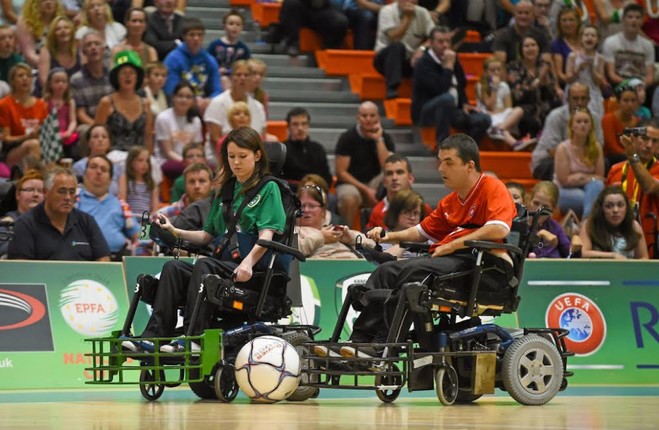2017 IS A big year for the Irish Powerchair team. Next July, they are set to be one of 10 countries competing in the World Cup in Florida.
For those unaware of what powerchair football is about, it is essentially a team sport for disabled people who use power wheelchairs.
Games feature two teams of four players with the powerchairs equipped with foot guards to attack, defend, and spin-kick a 13-inch football on a standard-sized basketball court, while the matches take place over two 20-minute periods.
The rules are basically the same as association football, though there are a few differences such as the two-on-one rule (‘only one player and an opponent — excluding goalkeepers when in the penalty area — are allowed within three metres of the ball when it is in play’) and the three-in-the-goal-area rule (‘the defending team is allowed a maximum of two players in their goal area at any one time’).
These rules are largely implemented to prevent the play being clogged up, ensuring space is created on the pitch, and breaching them generally tends to result in an indirect free kick for the opposition.
Intentionally ramming into another player is also illegal and because many participants physically cannot throw the ball, there are ‘kick-ins,’ from which goals can be scored directly, rather than throw-ins.
The sport originated in France in the 1970s, while FIPFA (Fédération Internationale de Powerchair Football Association) was set up to govern the sport as recently as 2006.
With Ireland currently ranked among the 10 best teams in the world, the prospect of taking home the 2017 FIPFA World Cup — the third tournament in the competition’s history after Tokyo in 2007 and Paris in 2011 — is far from inconceivable.
The arduous task of selecting the lucky individuals to play in the tournament took over a year, with numbers gradually whittled down. Ultimately, it was decided that Emer O’Sullivan (squad captain), Neil Sheehan, Keith Hayes, Thomas Donogher, Naglis Montvilas, Aoife McNicholl, Thomas Winters, Sean Donogher and Patrick Flanagan would represent their country this summer.
Yet the challenges are only beginning for these players who have come through the lengthy trial period.
It is estimated that getting Team Ireland to Florida will cost in the region of €50,000 in total. Costs incurred will include two chairs to transport (their own personal powerchair and their sports competition chair), the flights of eight athletes, eight professional carers and five coaching, management and technical staff, medical and sports insurance costs as well as basic necessities including food and accommodation.
With all this in mind, the team have set a fundraising target of €10,000 (more details of which can be found at the bottom of this piece) and have joined forces with the crowdfunding initiative PledgeSports, as they bid to ensure Ireland have the best possible chance of triumphing this summer
The Irish side previously competed in the 2014 EPFA Nations Cup held in the University of Limerick — an invaluable experience in which they ultimately finished fourth of six teams, with France beating England 5-0 in the final.
With hosts USA winning the previous two World Cups, the Americans will go into the competition as firm favourites, though the Irish remain hopeful of causing an upset.
Donal Byrne, who is part of the Association of Irish Powerchair Football, believes other teams will be “wary” of the side.
“We have good experienced players now,” he tells The42. “Seven of them last October were over at the European club competition, the Champions Cup, in Denmark. So a lot of the players from the countries would have been playing in the club teams there too. It’s good to have got that experience as well under their belt before they go to a major competition.
We were only getting going in 2007 (when the first World Cup was happening). We did go to the 2011 one and we were only really an emerging football country. Then, in 2014, we hosted the inaugural European Nations Cup in Limerick, which was a fantastic event. We lost in the third-fourth place playoff to Belgium. But Belgium had these chairs that we have now.
“It does come down to the equipment sometimes as well. And for the penalty shootout, they had the upper hand on us just by virtue of the chairs they were in. I think people realised then that we were going to be a country that could go to the World Cup and compete.”
For details on how to donate to the Irish Powerchair team, click here.
The42 is on Instagram! Tap the button below on your phone to follow us!

